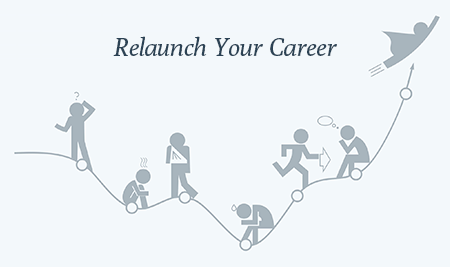So you’re unhappy at work. Maybe you’re feeling mentally and physically drained. Maybe every weekday is an agonizing fight to stay engaged and feel good about your organization. You may be tired of having to be someone you’re not just to survive the demands of your job. You don’t feel like you’re growing, working on things that energize you, or focusing on projects that can actually advance your career and have a real impact.
I get it. I’ve been there. Many times.
The most recent example for me was being involved in a marketing role selling products I didn’t really care about, spending more time navigating politics and trying to make other stakeholders happy when I myself was not happy. The worst was that I was waking up each Monday morning feeling unmotivated, depleted, and unexcited about the week ahead.
The problem is, you can’t always just pick up and quit. You’ve got bills to pay. A mortgage. Continuity on your CV to maintain.
So for now, you decide to stick it out. You’re not going anywhere. At least not yet. But what do you do when every single day sucks the energy out of you? When you find yourself at an organization or job misaligned with your values, ambitions, and personality.
Here are five concrete ways that I’ve used in my own career that helped me stay afloat during challenging times. Many of my clients have also said these tactics can make a tangible difference.
1) Pursue side projects
 If you’re not finding fulfillment at work, look outside of the office to feed your interests. Make sure you’re involved in activities you find energy generating, especially if your day job is depleting. Although people often think this means enrolling in a course, or getting involved as a volunteer for a cause, it can be even simpler than that. You could listen to a podcast you enjoy while you’re cooking dinner at night. You could read a book related to one of your interests during your commute.
If you’re not finding fulfillment at work, look outside of the office to feed your interests. Make sure you’re involved in activities you find energy generating, especially if your day job is depleting. Although people often think this means enrolling in a course, or getting involved as a volunteer for a cause, it can be even simpler than that. You could listen to a podcast you enjoy while you’re cooking dinner at night. You could read a book related to one of your interests during your commute.
To give you an example, when I was in my most recent Global marketing role, I decided to enroll in a professional coach training program. It not only clarified where I wanted to take my career, but also laid the foundations for the eventual launch of my own career consultancy. I started small. I dipped my toe in. I couldn’t do much more than that while balancing a full-time job, but it was enough to keep me engaged in life.
2) Tweak your role
 If you’re not enjoying your work, sometimes you can make a tweak. Take some time to clarify exactly what is bothering you in your current role. Then, think about whether you could tweak the nature of your involvement in those projects. Try to have a conversation with your manager (diplomatically) at an appropriate time (like a weekly 1-on-1) to discuss what possibilities there may be for you tweak your projects. You may not get what you want right away, or at all for that matter. But if you don’t ask, nothing will change.
If you’re not enjoying your work, sometimes you can make a tweak. Take some time to clarify exactly what is bothering you in your current role. Then, think about whether you could tweak the nature of your involvement in those projects. Try to have a conversation with your manager (diplomatically) at an appropriate time (like a weekly 1-on-1) to discuss what possibilities there may be for you tweak your projects. You may not get what you want right away, or at all for that matter. But if you don’t ask, nothing will change.
I’ve actually been pleasantly surprised at how open my past managers have been when I’ve taken the time to share with them when I’m genuinely feeling depleted. Most of them have responded well. As long as I wasn’t demanding, threatening, or pushing ultimatums (I’ve done this before too. It doesn’t go well), people were open to tweaking things, as long as the business’s demands are still being met.
As Tony Robbins once said, “You may only be 1 millimeter off.”
3) Get help from a mentor
 Sometimes, you just can’t do everything alone. If you’re like me, you don’t always feel great about having to ask for help. We all want to feel in control. We all want to appear in control. The thing is, you’re human. You have limitations. Sometimes you can’t figure everything out alone. One conversation with a helpful mentor, advisor, or friend, can be incredibly clarifying. You just have to take the time to seek out these people, and ask for their help.
Sometimes, you just can’t do everything alone. If you’re like me, you don’t always feel great about having to ask for help. We all want to feel in control. We all want to appear in control. The thing is, you’re human. You have limitations. Sometimes you can’t figure everything out alone. One conversation with a helpful mentor, advisor, or friend, can be incredibly clarifying. You just have to take the time to seek out these people, and ask for their help.
When I was working in a consulting job in Washington DC, I was incredibly confused about where to take my career. I went to see a career counselor for several months who served as a useful sounding board for me during the most important transition in my career. You have to give yourself permission to ask for help when you don’t have all the answers. It reminds me of what Emma Thompson says in the movie Burnt, “You can’t do this alone. There’s strength in needing others. Not weakness.”
4) Network to uncover options
 In spite of all the social networking that exists out there, and the increase in the number of recruiters who turn to social media to find candidates, good old-fashioned networking, where you connect with and meet people in person, is still the most effective way to uncover untapped opportunities in the job marketplace. Even if you aren’t planning on moving on anytime soon, right now is an ideal time to begin warming up your network. Just knowing people are out there doing different things or may be willing to help, can be incredibly comforting.
In spite of all the social networking that exists out there, and the increase in the number of recruiters who turn to social media to find candidates, good old-fashioned networking, where you connect with and meet people in person, is still the most effective way to uncover untapped opportunities in the job marketplace. Even if you aren’t planning on moving on anytime soon, right now is an ideal time to begin warming up your network. Just knowing people are out there doing different things or may be willing to help, can be incredibly comforting.
When I was trying to make the leap from the US to the UK, I found the prospect of doing so incredibly overwhelming. I started reaching out to people just to get the lay of the land, and things began to feel less daunting. One of the people whom I took the time to meet during a trip to London ended up helping me get my foot in the door at Gü, where I first worked after landing in the UK. A few years later, the recruiter I connected with when I was still in the US ended up being the very person who headhunted me for my eventual roll at Häagen-Dazs.
5) Focus on your “why”
 Okay, so we’re going to get a little touchy-feely now. Sometimes, if you’re feeling down in the dumps, and really frustrated with your situation, yet you’ve decided NOT to leave, reconnecting with your motivations behind why you took this job in the first place, what you hope to get out of it, and the benefit of staying put, can be a nice daily reminder to reground and keep you on track.
Okay, so we’re going to get a little touchy-feely now. Sometimes, if you’re feeling down in the dumps, and really frustrated with your situation, yet you’ve decided NOT to leave, reconnecting with your motivations behind why you took this job in the first place, what you hope to get out of it, and the benefit of staying put, can be a nice daily reminder to reground and keep you on track.
I once had a role at a company where I felt completely misaligned with the culture there. But I stuck things out, because the brand was red-hot, and I wanted to finish some once-in-a-lifetime marketing projects. Continuity on this brand would allow me to establish myself as a serious marketer, and build an extremely strong professional network in the city. So I stuck things out. And to this day, years later, I still tap into lessons, the network, and the skills I developed during that time.
Hear Joseph Liu’s thoughts on making your job tolerable
Where to start?
So those are five ways to offset some the negativity you’re feeling right now. To figure out your own ways to make work more tolerable, download my worksheet to help you brainstorm & organize some concrete steps you can take in your own situation, to help you stay afloat during this challenging time.



